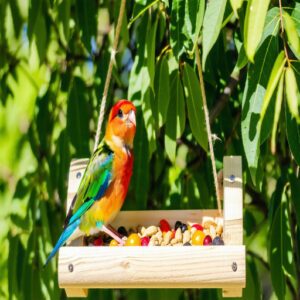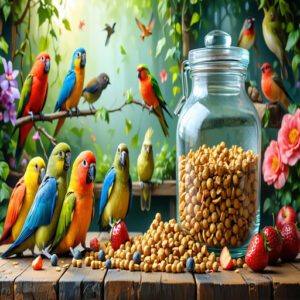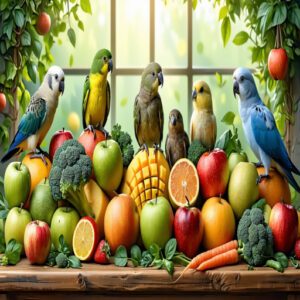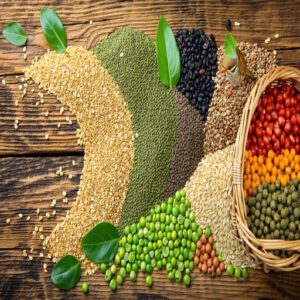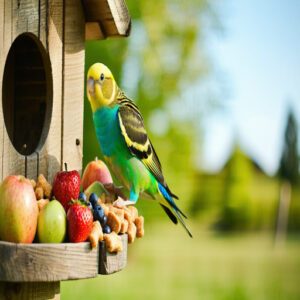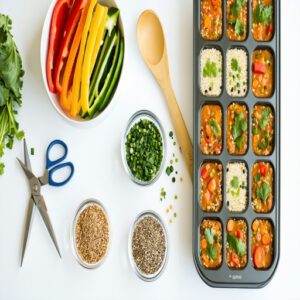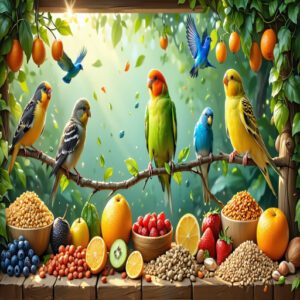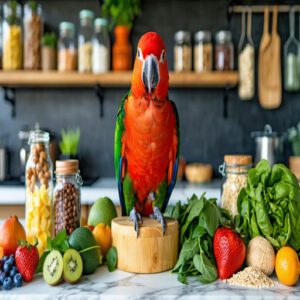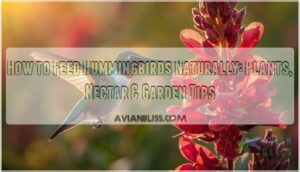This site is supported by our readers. We may earn a commission, at no cost to you, if you purchase through links.
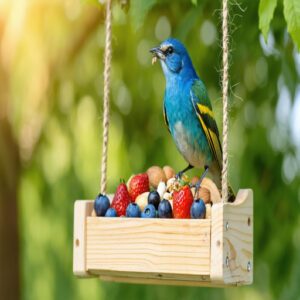
Focus on a balanced diet with pellets making up 70-90% of their meals; these pack everything they need.
Mix in seeds and nuts for fun snacking and protein, but don’t overdo it.
Fresh foods like dark leafy greens and chopped fruits can boost vitamins and minerals, especially calcium for strong bones.
Energy-rich grains and occasional suet (for higher energy needs) are also great.
Skip sugary treats or fatty junk foods.
The right diet keeps feathers shining and your bird chirping with joy.
Table Of Contents
- Key Takeaways
- Essential Bird Nutrients
- Choosing Bird Food
- Top 8 Bird Food Options
- Healthy Bird Diet Routine
- Customizing Bird Diets
- Frequently Asked Questions (FAQs)
- How to feed a pet bird a healthy diet?
- What type of bird food should I feed my bird?
- How do you feed a picky pet bird?
- Should you give your pet the best bird feed?
- Does a bird have a good diet?
- Can a pet bird eat birdseed as a regular food?
- What is the best food for pet birds?
- What should an owner feed their pet bird?
- What is the healthiest thing to feed birds?
- How often should you feed pet birds?
- Conclusion
Key Takeaways
- Prioritize pellets as 70-90% of your bird’s diet for balanced nutrition, and use fresh produce like dark leafy greens and fruits to supplement essential vitamins and minerals.
- Avoid seed-only diets as seeds are high in fat and lack nutrients; they should be occasional treats rather than a staple food.
- Provide clean, fresh water daily and toss uneaten perishable food within 2 hours to maintain health and hygiene.
- Encourage natural foraging by hiding food in toys or puzzles to keep your bird mentally stimulated and happy.
Essential Bird Nutrients
You’ll need to understand the essential nutrients that keep your feathered friend healthy, just like your own body needs a balanced diet.
From proteins that build strong feathers to vitamins that support bone health, your bird’s nutrition needs careful attention to prevent common health issues that can arise from an imbalanced diet, particularly to support bone health.
Proteins for Feather Development
Two essential building blocks of feather growth are alpha and beta-keratins, specialized proteins your bird needs daily.
Quality protein sources help maintain healthy plumage and support natural molting cycles.
For ideal feather health and development, consider a balanced diet rich in nutrients.
Look for bird foods rich in amino acids, which fuel feather development and keep your pet’s coat vibrant.
A balanced mix of seeds, nuts, and pellets provides the protein variety needed for perfect feather health, supporting overall feather growth.
Fats for Energy Balance
Beyond growing strong feathers, your pet bird needs proper fat sources for daily energy.
Suet, a specialized fat from cattle kidneys, packs twice the calories of seeds for your feathered friend’s energy needs.
Although traditionally a winter food, suet provides essential energy year-round, especially during demanding nesting periods, as detailed on this informative suet page.
Your bird’s balanced diet should include quality fats for ideal pet bird nutrition.
- Choose rendered suet in cage feeders for clean, safe feeding
- Mix up plain and flavored commercial suet cakes for variety
- Look for suet blends with added seeds and dried fruits
- Feed suet year-round, especially during high-energy seasons
Vitamins and Minerals for Bone Health
Just like your body uses vitamins and minerals for strong bones, your bird’s skeletal health depends on calcium intake and proper mineral balance.
You’ll want to focus on vitamin D, which helps with nutrient absorption and maintains bone density.
Adding cuttlebone or mineral blocks to your bird’s cage lets them self-regulate their calcium needs, while offering dark leafy greens boosts their overall mineral intake naturally.
Carbohydrates for Energy and Health
Carbohydrates serve as your bird’s primary energy source, powering everything from flight to daily activities.
Complex carbs from grains provide steady energy, while fiber sources aid digestion.
Your feathered friend needs a mix of starch benefits from cereals and controlled sugar intake from fruits.
For ideal bird health, balance their nutrition with quality carbohydrates from wheat, millet, and oats, focusing on proper bird nutrition.
Learn more about proper bird nutrition for a balanced diet.
Just watch those portions to maintain energy balance and ensure your bird stays healthy with a diet that includes quality carbohydrates.
Choosing Bird Food
You’ll find that selecting the right food for your pet bird doesn’t have to be as complicated as solving a puzzle in your morning newspaper.
While seeds might be your feathered friend’s favorite snack, they’ll need a balanced mix of pellets, fresh produce, and occasional treats to thrive and maintain peak health.
Pellet-Based Diets for Balanced Nutrition
Your bird’s daily nutrition revolves around a solid foundation of balanced pellets.
Research shows they’re the nutritional powerhouse your feathered friend needs, making up 70-90% of their diet.
Parrot pellets work like a complete meal plan, packing every bite with vitamins and minerals.
For the best avian nutrition, pick pellets sized right for your bird’s species that skip artificial dyes.
For a truly healthy option, consider switching to organic bird food pellets.
Fresh Fruits and Vegetables for Added Nutrition
Every nutritious diet needs Fresh Produce, with vegetables making up 15-30% and fruits around 5% of daily intake.
Your feathered friend will get a Nutrient Boost from dark leafy greens, while bright yellow and orange Veggie Benefits come from carrots and bell peppers.
For ideal bird nutrition, aim for a 10:1 ratio of vegetables to Fruit Variety, making these Healthy Snacks count.
You can find a variety of healthy bird fruits products online.
Grains and Legumes for Variety
Adding grains and legumes to your bird’s menu opens up a world of nutritional variety.
When you mix quinoa, brown rice, or barley into their diet, you’ll boost their protein and fiber intake.
Here’s what works great for most pet birds:
- Cooked quinoa benefits include complete protein and essential minerals
- Plain oats or barley provide steady energy without the fat of seeds
- Well-cooked legumes pack a protein punch while keeping costs down
Using quinoa bird food options can be a great way to add variety to your bird’s diet.
Top 8 Bird Food Options
You’ll find eight premium bird food options that provide essential nutrients for your feathered friend’s ideal health and happiness.
Whether you have a cockatiel, parakeet, or finch, these carefully selected food blends combine pellets, seeds, and dried fruits to meet your pet’s specific dietary needs.
1. Complete Guide to Pet Cockatiels
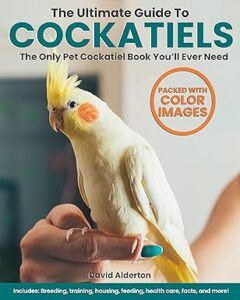
Learning the ropes of cockatiel nutrition starts with this 89-page guide, published in March 2023.
You’ll discover essential feeding schedules and dietary adjustments formulated for your feathered friend’s best health.
The guide breaks down the balance between seeds, pellets, and fresh produce, helping you avoid common nutritional pitfalls.
While it’s great for beginners, experienced owners might find it basic.
The handbook covers key diet components and toxic foods to avoid, making it a solid foundation for new cockatiel parents seeking straightforward nutrition advice.
Best For: New cockatiel owners seeking a straightforward guide to nutrition and care.
- Covers essential feeding schedules and dietary needs.
- Highlights toxic foods to avoid for cockatiels.
- Easy-to-follow advice for beginners.
- Lacks depth for experienced owners.
- Limited information on advanced dietary customization.
- Too basic for those looking for extensive details.
2. Wild Harvest Bird Food Blend
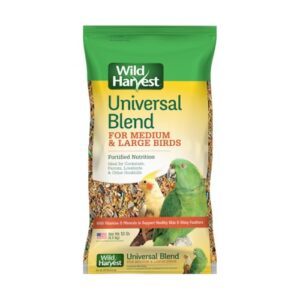
Feeding time becomes a breeze with Wild Harvest Bird Food Blend, a complete nutrition mix rated 4.5 out of 5 stars by bird owners.
The 10-pound pack delivers premium sunflower and safflower seeds plus dried vegetables, perfect for cockatiels, parrots, and other hookbills.
You’ll get a vitamin-fortified blend that supports healthy skin and gleaming feathers. Made in the USA, this universal blend eliminates the need for multiple food types.
Keep it fresh in a cool spot, and remember to pair with clean water daily.
Best For: Medium and large bird owners looking for a nutrient-rich, universal seed and vegetable blend that supports healthy skin and feathers.
- Fortified with vitamins and minerals for optimal bird health.
- Universal blend suitable for multiple bird species, saving hassle.
- Contains premium sunflower and safflower seeds that birds love.
- Some users report occasional packaging issues, like tears in the bag.
- Seeds may be too large for smaller birds.
- Requires proper storage to maintain freshness.
3. Wild Harvest Parakeet Nutrition Blend
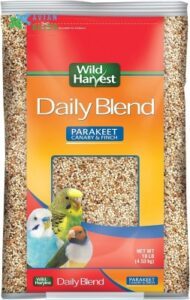
Wild Harvest’s Parakeet Nutrition Blend delivers a power-packed mix of red and white millet, canary grass seed, and select grains.
You’ll find your feathered friend getting essential vitamins and minerals from this balanced formula, enhanced with a subtle orange essence.
The 10-pound package comes in a barrier bag to lock in freshness.
Fill your bird’s cup daily with fresh seed, and store the rest in a cool, dry spot.
It’s a cost-effective choice that’s earned praise from bird owners for keeping their pets healthy and chirping happily.
Best For: Small bird owners looking for an affordable and nutritious seed blend to keep their parakeets, canaries, or finches healthy and satisfied.
- Includes essential vitamins and minerals to support bird health.
- Cost-effective 10-pound package with a resealable bag for freshness.
- Enhanced with orange essence for added flavor that birds love.
- Some customers report occasional issues with bugs in the food.
- Certain seeds may be too large for smaller birds.
- Limited fruit and vegetable content compared to expectations.
4. Cockatiel Food with Safflower Blend
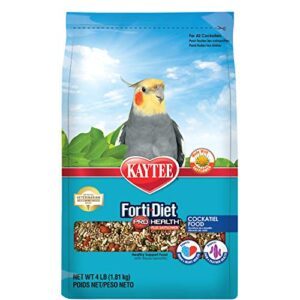
Cockatiel Food with Safflower Blend offers a sunflower-free recipe packed with nutrients your bird needs.
This colorful, fortified mix includes safflower seeds, millet, oats, and canary seeds blended with vitamins, plant-based Omega-3s, and probiotics for healthy digestion.
Free of artificial colors, preservatives, and peanuts, it’s a clean diet that supports shiny feathers and overall health.
Birds love its variety, and you’ll appreciate the resealable bag for freshness.
Try pairing it with fresh veggies for a balanced, fun feeding routine.
Best For: Cockatiel owners looking for a sunflower-free, nutrient-packed food blend that supports digestion, feather health, and overall well-being.
- Packed with safflower seeds, millet, and added vitamins for balanced nutrition.
- Includes probiotics and Omega-3s for digestion and shiny feathers.
- Free of artificial colors and preservatives, with a resealable bag for freshness.
- Some birds may take time to adjust to the new blend.
- Potential for waste or dust from smaller seeds.
- Not a complete diet—requires supplementation with fresh fruits and veggies.
5. Conure and Lovebird Food Blend
Packed with safflower seeds, oat groats, and pumpkin seeds, the Conure and Lovebird Food Blend is like a nutrition-packed buffet for your feathered friends.
Enhanced with papaya and carrots, it checks the box for natural fruit and veggie variety.
This blend is triple-cleaned for freshness, so picky lovebirds and conures get every bite’s crunch and taste.
Plus, the added vitamins and minerals guarantee robust health and glossy feathers.
It’s a flavorful, nutrient-rich mix birds can’t resist, keeping them both happy and healthy.
Best For: Conure and lovebird owners looking for a balanced, nutrient-rich food mix to support their birds’ health and vibrant plumage.
- Triple-cleaned and nitrogen-flushed for maximum freshness.
- Enriched with vitamins and minerals for overall bird health.
- Includes a mix of seeds, grains, fruits, and veggies for variety and nutrition.
- Specific ingredient quantities aren’t listed for transparency.
- Doesn’t provide detailed nutritional content like protein or fat percentages.
- Limited to conures and lovebirds, so not suitable for all bird species.
6. Kaytee Parakeet Pro Health Bird Food
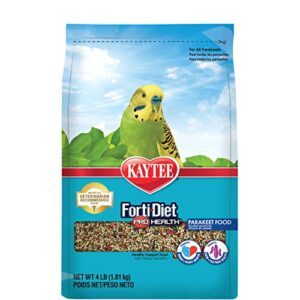
If you want happy, healthy parakeets, Kaytee Parakeet Pro Health Bird Food might just hit the mark.
Packed with DHA omega-3 fatty acids, it boosts brain, heart, and feather health, while probiotics and prebiotics keep digestion smooth.
Its colorful seed mix is irresistible, making it as tasty as it’s nutritious, plus, the resealable packaging keeps things fresh and easy to store.
Slowly introduce it to avoid resistance, and watch your bird’s energy and plumage shine, a strong pick for parakeet diets.
Best For: Parakeet owners looking for a nutritious, veterinarian-recommended food that enhances bird health and supports vibrant feathers.
- Contains DHA omega-3 for brain, heart, and feather health.
- Includes probiotics and prebiotics for smooth digestion.
- Resealable packaging keeps food fresh and easy to store.
- Requires a gradual introduction period to avoid resistance.
- Feeding instructions suggest consuming within 30-45 days after opening, limiting storage time.
- Not suitable for bird species outside the intended range, like larger parrots or non-seed eaters.
7. Wild Harvest Canary Finch Food
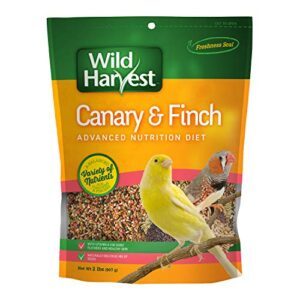
Looking for a balanced mix for your canary or finch? Wild Harvest Canary Finch Food hits the mark with a blend of millet, oat groats, and flax seed.
It’s enriched with vitamins, minerals, and Omega-3 fatty acids for shiny feathers and healthy skin. Birds love the fresh, irresistible taste, and the mix encourages natural foraging behaviors.
Feed 1 to 3 teaspoons daily, adjusting based on your bird’s appetite. While the packaging can be flimsy, the quality seeds make it worth considering.
Best For: Owners of canaries and finches looking for a vitamin-enriched seed mix that supports healthy feathers and skin while encouraging natural foraging.
- Enriched with vitamins, minerals, and Omega-3 for shiny feathers and healthy skin.
- Irresistible taste that birds love, encouraging foraging behaviors.
- High-quality seed mix at a good value for the price.
- Packaging may be thin and prone to damage.
- Includes artificial color additives like FD&C dyes.
- Some mixed opinions on bird health and product consistency.
8. Healthy Canary and Finch Food
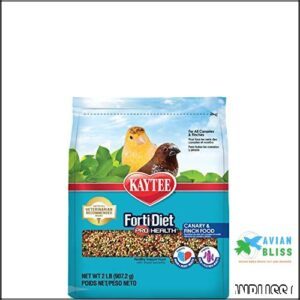
If you’re after a balanced diet for your finches and canaries, look for products labeled "healthy" blends.
These often combine small seeds, vitamins, and minerals to meet their unique nutritional needs.
Include options rich in Omega-3s to boost feather quality and immune health.
Always check for natural preservation, like Kaytee’s 2-pound blend, known for supporting digestion with prebiotics.
Avoid fillers or artificial extras that harm more than help.
And hey, keep it fresh—birds deserve the good stuff daily.
Best For: Bird owners looking to enhance the feather health, digestion, and overall vitality of their finches and canaries with a natural, veterinarian-recommended seed blend.
- Contains Omega 3’s and probiotics for brain, heart, and digestive health.
- Naturally preserved for freshness with no artificial additives.
- Highly rated by customers for improving bird feather quality and overall health.
- Some customers reported issues with shipping and handling costs.
- Not readily available in local pet stores for immediate purchase.
- Limited to a 2-pound bag size, which may not suit larger bird flocks.
Healthy Bird Diet Routine
Building a healthy diet routine for your bird helps guarantee long-term well-being and happiness.
By sticking to a daily mix of pellets, fresh produce, and occasional treats, you’ll keep your feathered friend both nourished and entertained, which is crucial for their happiness.
Daily Feeding Guide for Birds
Wondering how to plan meals for your feathered friend?
A balanced daily feeding guide keeps your bird healthy and happy.
Stick to regular schedules with these tips:
- Morning: Serve fresh fruits and veggies to kickstart energy.
- Midday: Keep pellets as the diet’s core.
- Evening: Add grains or legumes for variety.
Watch portions to avoid overeating!
Importance of Fresh Water and Hydration
Don’t underestimate water in bird care—it’s as essential as their food.
Clean, fresh sources daily prevent dehydration and boost bird health.
Pay attention to water quality; avoid tap water with heavy chemicals.
Birds can be picky about drinking habits, so make easy access available.
Hydration tips? Keep bowls shallow and sparkling, and always check for bird thirst!
A well-planned healthy diet routine is also indispensable for maintaining peak bird health.
Avoiding Unhealthy Foods and Substances
Some foods can harm your bird, even in small amounts.
Avoid these potential dangers to keep their avian diet safe:
- Toxic Foods: Avocado, chocolate, caffeine, alcohol, onions, and garlic.
- Unhealthy Seeds: Overly fatty options like sunflower seeds cause nutrient deficiencies.
- Harmful Substances: No-salt crackers or dairy might seem birdsafe but aren’t healthy snacks.
Stick to birdsafe treats for happy, healthy pet bird care.
Encouraging Foraging Behavior for Mental Health
Foraging keeps your feathered friend busy and sharp!
Scatter food in toys or hide treats under paper for natural foraging.
It mimics wild bird behavior, offering both mental stimulation and better behavioral health.
| Foraging Techniques | Benefits | Examples |
|---|---|---|
| Hiding Food | Mental Stimulation | Wrap seeds in paper |
| Shreddable Toys | Bird Enrichment | Cardboard rolls |
| Puzzle Feeders | Behavioral Health | Stuff with fruit/pellets |
Try these for fun and mental health!
Customizing Bird Diets
Every bird has unique dietary needs, so it’s important to tailor their meals to their species and lifestyle.
By learning what your bird requires, you can create a healthy, balanced diet that keeps them happy and thriving.
Bird Chop and Preparing Customized Meals
Getting creative with bird chop brings fun and variety to your parrot’s diet. It’s a customizable mix of fresh veggies, grains, and beans—perfect for balanced bird nutrition plans.
Follow these steps for safe, healthy meals:
- Chop ingredients small: Bite-sized is best.
- Stick to fresh food safety: Remove leftovers after 2 hours.
- Meal portion control: Start with a few teaspoons.
Creating a customized diet also involves understanding the benefits of custom bird food to guarantee a well-rounded nutrition plan.
Selecting The Right Foods for Specific Bird Types
Choosing bird food means matching meals to your pet’s personality.
Parrots thrive on balanced pellets and fresh veggies, while finch diets should prioritize energy-packed seeds like Nyjer.
Cockatiels, like their parrot cousins, need 75% pellet-based food with healthy extras.
A well-balanced diet often includes high-quality parrot food pellets.
Use this guide to understand the dietary needs of different bird species.
| Bird Species | Main Diet | Treats |
|---|---|---|
| Parrots | Pellets, veggies | Nuts, fruits |
| Finches | Seeds, pellets | Fresh greens |
| Cockatiels | Pellets, veggies | Limited seeds |
| Conures | Pellets, fruits | Nutri-Berries |
| Canaries | Canary pellets | Leafy greens |
Avoiding Common Dietary Mistakes and Toxins
Avoid simple but common dietary errors that could harm your bird.
A Toxic Food List includes avocados, caffeine, onions, and chocolate—all known to cause severe health issues or even death.
Moldy seeds or nuts? They’re a shortcut to bird poisoning.
Stick to a balanced bird diet, follow a bird nutrition guide, and protect their avian wellness by avoiding these dangers.
Consulting With Avian Veterinarians for Personalized Advice
In the context of bird nutrition, avian veterinarians are your go-to partners for expert consultation.
They’ll recommend personalized diets based on your pet bird’s age, species, or health.
Need bird health tips for molting or picky eating? Vets can advise supplements safely.
Never wing it—veterinary guidance guarantees your bird’s diet boosts avian health, preventing issues before they start.
Frequently Asked Questions (FAQs)
How to feed a pet bird a healthy diet?
Give your bird a mix of pellets (70-80%), fresh fruits, and vegetables daily.
Avoid overloading on seeds—they’re like candy.
Keep water fresh, toss leftovers quickly, and steer clear of chocolate, caffeine, or avocado.
What type of bird food should I feed my bird?
Did you know 80% of a bird’s diet should be nutritionally balanced pellets?
Pair pellets with fresh veggies, occasional fruits, and grains for variety.
Skip high-fat seeds as daily staples to keep them healthy!
How do you feed a picky pet bird?
Start by mixing new foods with familiar favorites.
Try chopping fruits or vegetables into tiny, bite-sized pieces.
Offer pellets as the base, and get creative—sprinkle treats like unsalted nuts or seeds to entice curiosity.
Should you give your pet the best bird feed?
What’s the key to a healthy, happy bird?
Absolutely, you should invest in the best bird feed available.
Quality feed guarantees balanced nutrition, prevents health problems, and keeps feathers vibrant—because your bird deserves nothing less.
Does a bird have a good diet?
A good diet for your bird includes high-quality pellets, fresh fruits, vegetables, and occasional seeds.
Skip junky fillers or fatty snacks.
Think of it like crafting a colorful salad—variety and balance keep them thriving.
Can a pet bird eat birdseed as a regular food?
Birdseed shouldn’t be a bird’s main meal—it’s like living on chips.
Seeds are tasty but high in fat and low in nutrients.
Balance them with pellets, vegetables, and fruits for a healthier diet.
What is the best food for pet birds?
A mix of high-quality pellets (around 80%), fresh vegetables, and small amounts of fruits keeps your bird healthy.
Sprinkle in the occasional treat or seed for variety, but avoid sugary or salty foods!
What should an owner feed their pet bird?
Think of your bird’s diet like a magic formula: 75–80% high-quality pellets, 15–20% fresh fruits and veggies, and occasional grains or seeds as treats.
Always provide fresh water and remove uneaten perishables promptly.
What is the healthiest thing to feed birds?
Feed birds a mix of high-quality pellets (about 80% of their diet) with fresh fruits, veggies, and some grains.
Skip salty snacks or sugary treats; it’s like trading their wings for a diet disaster.
How often should you feed pet birds?
Think of feeding your bird like daily mealtime for a tiny gourmand.
Offer fresh fruits and vegetables in the morning, pellets throughout the day, and grains or legumes in the evening.
Clean bowls daily!
Conclusion
Did you know a balanced diet can add years to your bird’s life, keeping them healthier and happier?
By prioritizing high-quality bird food for pet birds with nutrient-packed pellets, fresh fruits, vegetables, and grains, you’re ensuring they thrive.
Avoid seed-only diets and sugary snacks, as they can harm your feathered friend.
Consistent routines, fresh water, and foraging opportunities boost their mental and physical health.
Feed smart, and your bird will thank you with vibrant feathers and joyful chirps!
- https://wildbirdhabitatstore.com/suet-feeders/
- https://www.birdful.org/when-should-suet-be-put-out-for-birds/
- https://www.nativebirdcare.org/blog/safe-suet-feeding-again
- https://www.beakybites.co.uk/blog/the-ultimate-guide-to-suet-for-birds-feeding-tips-and-benefits
- https://www.catandbirds.com/a-bird-s-diet

